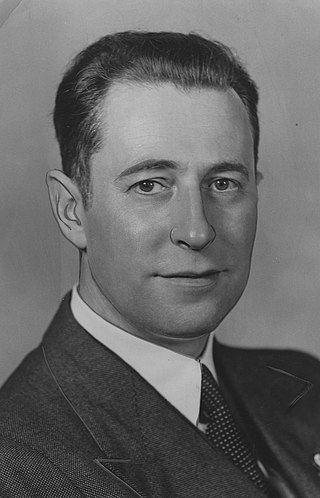
August Franz Anton Hans Fritzsche was the Ministerialdirektor at the Propagandaministerium of Nazi Germany. He was the preeminent German broadcaster of his time, as part of efforts to present a more popular and entertaining side of the Nazi regime, and his voice was recognised by the majority of Germans.
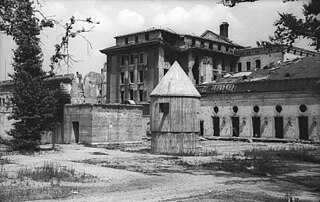
The Führerbunker was an air raid shelter located near the Reich Chancellery in Berlin, Germany. It was part of a subterranean bunker complex constructed in two phases in 1936 and 1944. It was the last of the Führer Headquarters (Führerhauptquartiere) used by Adolf Hitler during World War II.

Johanna Maria Magdalena "Magda" Goebbels was the wife of Nazi Germany's Propaganda Minister Joseph Goebbels. A prominent member of the Nazi Party, she was a close ally, companion, and political supporter of Adolf Hitler. Some historians refer to her as the unofficial "first lady" of Nazi Germany, while others give that title to Emmy Göring.
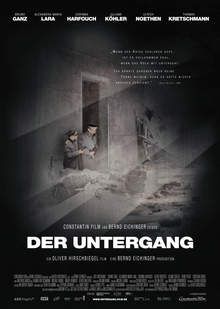
Downfall is a 2004 historical war drama film written and produced by Bernd Eichinger and directed by Oliver Hirschbiegel. It is set during the Battle of Berlin in World War II, when Nazi Germany is on the verge of total defeat, and depicts the final days of Adolf Hitler. The cast includes Alexandra Maria Lara, Corinna Harfouch, Ulrich Matthes, Juliane Köhler, Heino Ferch, Christian Berkel, Alexander Held, Matthias Habich, and Thomas Kretschmann. The film is a German-Austrian-Italian co-production.

Adolf Hitler, chancellor and dictator of Nazi Germany from 1933 to 1945, committed suicide via a gunshot to the head on 30 April 1945 in the Führerbunker in Berlin after it became clear that Germany would lose the Battle of Berlin, which led to the end of World War II in Europe. Eva Braun, his wife of one day, also committed suicide by cyanide poisoning. In accordance with Hitler's prior written and verbal instructions, that afternoon their remains were carried up the stairs and through the bunker's emergency exit to the Reich Chancellery garden, where they were doused in petrol and burned. The news of Hitler's death was announced on German radio the next day, 1 May.
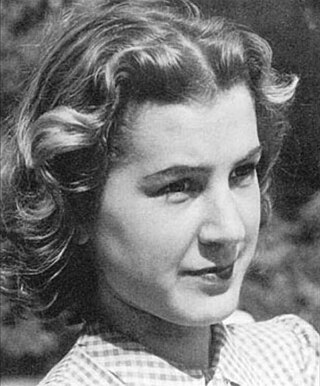
Gertraud "Traudl" Junge was a German editor who worked as Adolf Hitler's last private secretary from December 1942 to April 1945. After typing Hitler's will, she remained in the Berlin Führerbunker until his death. Following her arrest and imprisonment in June 1945, both the Soviet and the U.S. militaries interrogated her. Later, in post-war West Germany, she worked as a secretary. In her old age, she decided to publish her memoirs, claiming ignorance of the Nazi atrocities during the war, but blaming herself for missing opportunities to investigate reports about them. Her story, based partly on her book Until the Final Hour, formed a part of several dramatizations, in particular the 2004 German film Downfall about Hitler's final ten days.

Adolf Hitler, chancellor and dictator of Germany from 1933 to 1945, signed his political testament and his private will in the Führerbunker on 29 April 1945, the day before he committed suicide with his wife, Eva Braun.
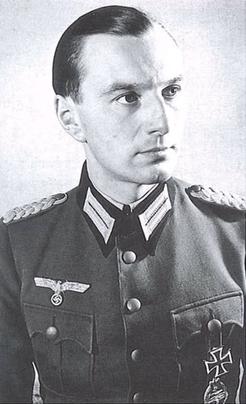
Alexander Otto Hermann Wolfgang Bernd(t) Freiherr Freytag von Loringhoven, was a Baltic German officer in the German Army during World War II. In 1956, he joined the German Federal Armed Forces, the Bundeswehr, and rose to the rank of Generalleutnant.

Walther Hewel was an early and active member of the Nazi Party who became a German diplomat, an SS-Brigadeführer and one of German dictator Adolf Hitler's personal friends. He served as the liaison officer between Reichsminister for Foreign Affairs Joachim von Ribbentrop and Hitler's headquarters. Present in the Führerbunker during the Battle of Berlin, he committed suicide while attempting to escape the Red Army after the breakout from the bunker.
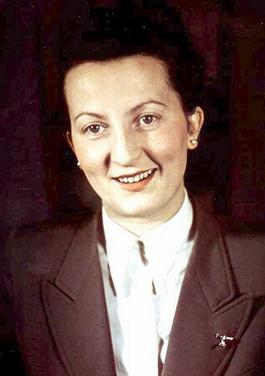
Gerda Christian, nicknamed "Dara", was one of Adolf Hitler's private secretaries before and during World War II.
Johannes Hentschel was a master electro-mechanic for German dictator Adolf Hitler's apartments in the Reich Chancellery. He also served in the same capacity in Hitler's Führerbunker in 1945. He surrendered to Soviet Red Army soldiers on 2 May 1945.
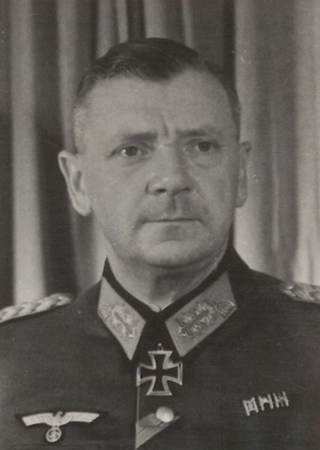
Wilhelm Emanuel Burgdorf was a German general who rose to prominence during the final years of World War II. Burgdolf served as a commander of 529th Infantry Regiment from May 1940 to April 1942. In October 1944, Burgdorf assumed the role of the chief of the Army Personnel Office and chief adjutant to Adolf Hitler. In this capacity, he played a key role in the forced suicide of Field Marshal Erwin Rommel. Burgdorf committed suicide inside the Führerbunker on 2 May 1945 at the conclusion of the Battle of Berlin.

Hans-Erich Voss was a German Vizeadmiral and one of the final occupants of the Führerbunker during the battle of Berlin in 1945. He was also among the last people to see both Adolf Hitler and Joseph Goebbels alive before they committed suicide. After the war in Europe ended, he spent several years in prison in both the Soviet Union and East Germany.
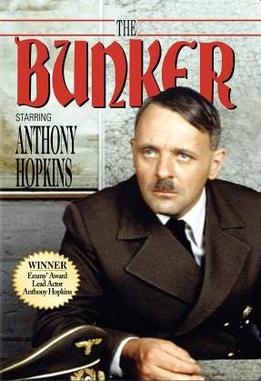
The Bunker is a 1981 American made-for-television historical war film produced by Time-Life Productions based on the 1975 book The Bunker by James P. O'Donnell.
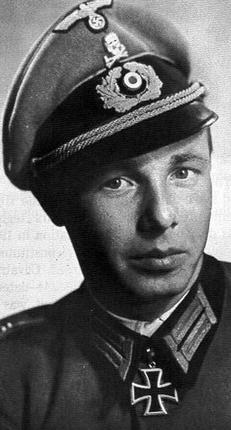
Gerhard Boldt was an officer in the German Army (Heer) who wrote about his experiences during World War II.
Günther August Wilhelm Schwägermann served in the Nazi government of German chancellor Adolf Hitler. From approximately late 1941, Schwägermann served as the adjutant for Joseph Goebbels. He reached the rank of SS-Hauptsturmführer (captain). Schwägermann survived World War II and was held in American captivity from 25 June 1945 until 24 April 1947.

Hans Krebs was a German Army general of infantry who served during World War II. A career soldier, he served in the Reichswehr and the Wehrmacht. He served as the last Chief of Staff of the Oberkommando des Heeres (OKH) during the final phase of the war in Europe. Krebs tried to open surrender negotiations with the Red Army; he committed suicide in the Führerbunker during the early hours of 2 May 1945, two days after Adolf Hitler killed himself.

The Last Ten Days is a 1955 Austrian-German drama film directed by G. W. Pabst. It was the first film in post-World War II Germany to feature the character of Adolf Hitler. It follows him and others in what were the last days of the Third Reich.
Events in the year 1945 in Germany.
Bis fünf nach zwölf – Adolf Hitler und das 3. Reich is a 1953 West German documentary film directed by Gerhard Grindel.
















